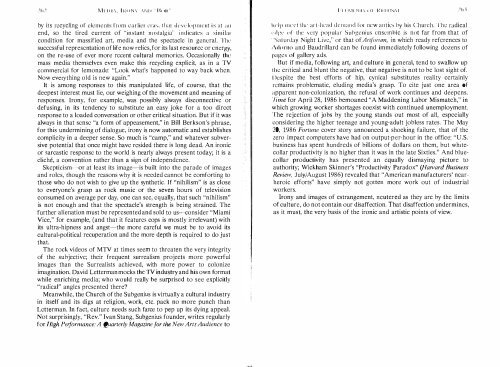CONTENTS - ouroboros ponderosa
CONTENTS - ouroboros ponderosa
CONTENTS - ouroboros ponderosa
Create successful ePaper yourself
Turn your PDF publications into a flip-book with our unique Google optimized e-Paper software.
[\/I I ' lll:\, 11{( lNY .\NIl "Hill!"<br />
by its rcycling of elemellts from carlier lor;!.',;, Ill;11 tlt-vl'lupillelit is at illl<br />
end, so thc tired current of "instant nostalgia" indicates a similal<br />
condition for massified art, media and the spectacle in general. Tht'<br />
successful representation of life now relics, for its last resource or energy,<br />
on the re-use of ever more rccent cultural memories_ Occasionally tht'<br />
mass media themselves even make this recycling explicit, as in a TV<br />
commercial for lemonade: "Look what's happened to way back when.<br />
Now everything old is new again."<br />
It is among responses to this manipulated Iifc, of course, that the<br />
deepest interest must lie, our weighing of the movemcnt and meaning of<br />
responses. [rony, for example, was possibly always diseonneetivc or<br />
defusing, in its tendency to substitute an easy joke for a too direct<br />
response to a loaded conversation or other critical situation. But if it was<br />
always in that sense "a form of appeasement," in Bill Berkson's phrase,<br />
for this undermining of dialogue, irony is now automatic and establishes<br />
complicity in a deeper sense. So much is "camp," and whatever subver<br />
sive potential that once might have resided there is long dead. An ironic<br />
or sarcastic response to the world is nearly always present today; it is a<br />
cliche, a convention rather than a sign of independence.<br />
Skcpticism-or at least its image-is built into the parade of images<br />
and roles, though the reasons why it is needed cannot be comforting to<br />
those who do not wish to give up the synthetic. If "nihilism" is as close<br />
to everyone's grasp as rock music or the seven hours of television<br />
consumed on average per day, one can sec, equally, that such "nihilism"<br />
is not enough and that the spectacle's strength is being strained. The<br />
further alienation must be represented and sold to us---consider "Miami<br />
Vice," for example, (and that it features cops is mostly irrelevant) with<br />
its ultra-hipness and angst-the more careful we must be to avoid its<br />
cultural-political recuperation and the more depth is required to do just<br />
that.<br />
The rock videos of MTV at times seem to threaten the very integrity<br />
of the subjective; their frequent surrealism projects more powerful<br />
images than the Surrealists achieved, with more power to colonize<br />
imagination. David Letterman mocks the TV industry and his own format<br />
while enriching media; who would really be surprised to see explicitly<br />
"radical" angles presented there?<br />
Meanwhile, the Church of the Subgenius is virtually a cultural industry<br />
in itself and its digs at religion, work, etc. pack no more punch than<br />
Letterman. In fact, culture needs such farce to pep up its dying appeal.<br />
Not surprisingly, "Rev." Ivan Stang, Subgenius founder, writes regularly<br />
for Iligh Performance: A Quarterly Magazine jar the New Arts Audience to<br />
I " r I· r\11 i'l 1:-. I )]. I 1'1,1 IS:\ 1<br />
hl'lp IlIlTt I Ill' art-lIl'ad dCllland for ]Jew an tics hy his Church. The radical<br />
("(I', (" or the very popular Suhgcnius cnsmhlc is not far from that of<br />
"Satuf'l]ay Night Live," or that of Artjim,m, in which ready references to<br />
,\






